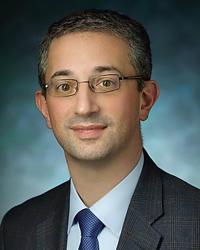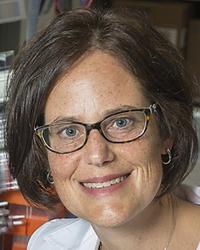Sarcoma Program
The Best Place for Sarcoma Treatment
Sarcoma is a challenging cancer that requires the expertise of many specialists. The Johns Hopkins Kimmel Cancer Center is the only cancer center in the midaltantic region that has experts from every specialty involved in the treatment of sarcoma together in one place to evaluate patients and to recommend a treatment plan. Other hospitals offer bits and pieces of specialty care, but we bring every expert to the table.
The biology of sarcomas is complex, with nearly a third of patients diagnosed with advanced cancers that are best treated by an experienced team. Unique clinical plans developed from the latest research findings position the Kimmel Cancer Center as a leader in sarcoma treatment and research.
Pediatric oncologists, medical oncologists, orthopedic surgeons, radiation oncologists, radiologists, and other experts see patients in a single day visit. Collaborations with the Bloomberg~Kimmel Institute for Cancer Immunotherapy and the only bone marrow transplant program that has overcome the rejection barrier means pediatric patients have access to the same therapies that are leading to unprecedented responses in adult cancer patients.
Having all of the experts together in one place allows for coordination of care—timing surgery, drug therapies and other treatments to better care for patients.
Everything a sarcoma patient needs is available at the Kimmel Cancer Center.
Make an Appointment | Meet Our Sarcoma Experts | Sarcoma Treatment | Sarcoma Research
About Sarcoma
Musculoskeletal tumors are cancers that occur in the muscles, bones or tendons. These cancers can be challenging to treat – recurrences are common and these tumors are very rare. Children with these tumors generally require coordinated care from a variety of experts, including surgeons and medical and radiation oncologists.
The Musculoskeletal Tumor Program at the Johns Hopkins Kimmel Cancer Center in Baltimore provides comprehensive, multidisciplinary care to all children diagnosed with these tumors. Every child seen by our program will have his or her case reviewed and discussed at our weekly multidisciplinary tumor conference, attended by subspecialists from the following groups:
- Pediatric Oncology
- Pediatric Surgery
- Orthopedic Oncology
- Radiation Oncology
- Medical Oncology
- Pathology experts in sarcoma
- Radiology experts in sarcoma
- Otolaryngology
- Neurosurgery
The care and management of each child is discussed in depth, allowing the group to formulate a comprehensive treatment plan tailored to address each child’s age, tumor type and location, and to coordinate the complex care children with sarcoma require. This approach maximizes the chance of cure and minimizes the degree of long-term side effects. Our sarcoma experts also are part of the Johns Hopkins Sarcoma Center, where they work closely with specialists who treat the disease in adult patients. This ensures a seamless transition and state-of-the-art care for teens and young adults with these tumors.
Read more about sarcomas common in children, including Ewing’s sarcoma, osteogenic sarcoma, rhabdomyosarcoma. As members of the Johns Hopkins Sarcoma Center, our experts are well-versed in many more types of rare bone and soft tissue tumors.
Appointments and Referrals
International Patients
Referral Coordinator (For patients in the United States)
Sarcoma Treatment
Sarcoma Surgery
 Carol Morris and Adam Levin
Carol Morris and Adam LevinSurgery in children can be challenging because they are growing and are very physically active. An experienced and knowledgeable team with specialized expertise in the surgical treatment of sarcoma is essential.
Our orthopaedic oncologists are skilled in all of the surgical techniques required to best treat children, teens, and young adults with sarcoma. This broad expertise and knowledge means the Kimmel Cancer Center can offer personalized solutions that meet the needs of patients. Choices are not limited by lack of experience and skill. All options can be considered. Our goal is to offer surgical reconstructions that keep up with the children's growth and are durable enough to allow them to be kids. We don’t want to remove the cancer but subject a child to a lifetime of operations.
Most sarcomas occur in the leg. Families usually choose limb-sparing surgery, meaning that the tumor is removed without amputating the leg. The Kimmel Cancer Center offers biologic bone reconstructions that use grafts from the patient as a permanent and durable alternative to prosthetics. Our orthopaedic oncologists developed procedures that get bones to regrow without a graft when the middle part of the bone is taken out to get the cancer. When prosthetics are desired or necessary, we use expandable prosthetics that grow with the young patients.
Broad skill and expertise means the Kimmel Cancer Center can provide personalized therapies that reflects the lifestyle and desires of each patient and family.
Sarcoma is known for its resistance to radiation therapy, but Kimmel Cancer Center researchers have developed a one-of-a-kind approach that allows higher, more effective doses of radiation to be given without causing harmful side effects.
The treatment is a radiation therapy delivered like chemotherapy. The radioactive drug, called a radiopharmaceutical, is self-guiding, homing in on cancer and safely but continually delivering radiation only to cancer cells. The radioactive drug reaches cancer cells throughout the body but is not absorbed by other tissues.
A specialized computer software system developed at Johns Hopkins measures and tracks how much of the radioactive drug is taken in by cancer, providing the potential to safely increase doses and deliver a greater anticancer punch. The treatment can also be combined with external beam radiation therapy.
Sarcoma, bone marrow transplant and immunology experts are collaborating to use haploidentical (half-matched) transplants and immunotherapy to treat advanced and recurrent Ewing’s sarcoma and osteosarcoma resistant to chemotherapy. The Kimmel Cancer Center-pioneered transplants expand the potential donor pool and have proven to be as safe as traditional fully matched bone marrow transplants. The donor T cells received during the transplant, in combination with immunotherapy that removes brakes on the immune system, provide a new option for patients with these advanced and treatment-resistant types of sarcoma.
Sarcoma Research
About a third of patients are diagnosed with advanced sarcoma. Treatments are initially very effective, but in some patients the cancer returns relentlessly. Researchers are developing tests to distinguish patients who are likely cured from those who will have their cancer come back and spread.
Among this research is the development of a blood test that captures cancer DNA, and specifically a genetic alteration unique to Ewing’s sarcoma. Patients who are cured should not have the alteration present in their blood, so the test would help identify patients who need additional therapy to prevent their cancers from coming back.
The Musculoskeletal Tumor Program includes a robust translational research program, in which our sarcoma doctors also conduct laboratory research to develop innovative therapies for bone and soft tissue sarcomas and bring them to clinical trials. We also participate in clinical trials run by the Sarcoma Alliance for Research Through Collaboration (SARC), a consortium of sarcoma programs from across North America, and by the Children’s Oncology Group (COG). In addition, industry-sponsored trials and clinical trials run by the Pediatric Oncology Experimental Therapeutics Investigators’ Consortium (POETIC) ensure that in addition to standard therapies, almost every child treated within the Johns Hopkins Musculoskeletal Tumor Program will have the opportunity to participate in cutting edge clinical research.
One ongoing effort aims to identify stem cells in certain bone tumors, and understanding how these cells elude drug therapies to drive the growth and spread of cancer.
Targeted Therapies
Dr. Christine Pratilis is translating her laboratory research on signaling pathways into a clinical trial. Certain mutations in signaling pathways give cancer cells escape routes that contribute to treatment resistance. She believes this may be at play in a small subset of sarcomas and other pediatric cancers, and she is beginning a clinical trial of a drug called trametinib that targets key mutations in these signaling pathways to cut off cancer’s escape routes. Drawing upon the Kimmel Cancer Center’s leadership in cancer gene discovery, Dr. Pratalis will use precision medicine techniques to select patients whose tumors contain the genetic signature that predicts for cancers most likely to respond to the drug.
Immunotherapy
The Kimmel Cancer Center is home to the Bloomberg~Kimmel Institute for Cancer Immunotherapy, and pediatric cancer and immunology expert Nicolas Llosa, M.D., is collaborating with Institute scientists and clinicians to apply progress in cancer immunotherapy to tough-to-treat sarcomas.
Kimmel Cancer Center experts have identified immune targets called immune checkpoints that help cancer hide from the immune system. Drugs that block these checkpoints have shown great promise to unleash an immune attack against even the most resistant cancers. “We have the perfect infrastructure here for cancer immunology research and an unparalleled opportunity for launching immunotherapy clinical trials in pediatric patients,” says Llosa.
Putting the Cancer Moonshot to Work for Pediatric Patients
 Elizabeth Jaffee at the White House
Elizabeth Jaffee at the White HouseVice President Biden’s Cancer Moonshot initiative is aimed at making ten year’s worth of cancer progress in five years. The Blue Ribbon Panel that is setting the direction for the Moonshot is co-chaired by Kimmel Cancer Center deputy director and immunology expert Elizabeth Jaffee. The panel’s recommendations include projects that will expand immunotherapy advances in adult cancers to children with cancer. The Kimmel Cancer Center, in collaboration with the Bloomberg~Kimmel Institute for Cancer Immunotherapy, is one of the few cancer centers with the expertise and internal structure to immediately implement the Moonshot’s immunotherapy directives in pediatric patients.




